Shevlin Sebastian's Blog, page 52
September 9, 2018
Overwhelmed By Cruelty To Animals, She Turns Vegan

By Shevlin Sebastian
Sometime ago, the Kochi-based yoga coach Sudakshna Thampi joined a group which rescued street dogs which had been hit by cars or were deliberately beaten or tortured. There were cases where people were planning to poison dogs or dump their puppies to get rid of them.
Soon, Sudakshna began to do research on the cruelty meted out to animals. “I saw with my own eyes how cows, packed very tightly together, were transported in open trucks,” she says. “They would travel for days without food or water before they were slaughtered.”
She also realised that many hens are egg-making machines. “They are genetically bred to lay between 250 to 300 eggs a year,” she says. “But in the wild, hens only lay eggs during the breeding season – primarily in the spring – and only enough eggs to assure the survival of the species.”
But laying an egg takes a lot of effort. “All the nutrients go into the egg and the hen becomes very weak and diseased,” says Sudakshna. “And finally they are slaughtered.”
All this cruelty made Sudakshna forgo non-vegetarianism and become a vegan. “I have food which has no animal products,” she says. So her diet includes dosa, sambar, wholegrain rice, chappatis, dal, fruits and salads. “By cutting milk out of my diet, my skin tone has improved,” she says. “There is no acne. I have not had skin problems for a long while.”
However, for those who love milk, Sudakshna suggests plant-based milk like soya. “It tastes similar and has no side-effects,” she says.
(An input for a cover story on veganism, Sunday Magazine, South India editions and New Delhi)
Published on September 09, 2018 21:46
September 5, 2018
Reaching Out To The Distressed
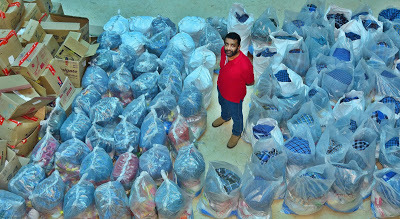
Anshu Gupta, the Magsaysay Award winner, talks about the efforts taken by his organisation, ‘Goonj, to help the flood-affected in Kerala
Photo by Albin Mathew
By Shevlin Sebastian
During his travels in Ernakulam district following the massive flooding in Kerala, Magsaysay Award winner Anshu Gupta came across a man feeding a banana to his cow. It was the first time in Kerala that he had seen this scene. “Nobody was bothered about the animals,” says Anshu, at the relief collection hub in the basement of the Gold Souk Mall, Kochi. “Many had died. Because of water everywhere, there was no fodder for the animals.”
In front of the man's house, his paddy field was under water. The man told Anshu, “I know people like you will give us rice and other materials. But the fact is that, after you go, nobody will be there for me. I have lost everything.”
And so have lakhs of people in Kerala. “People have lost financially, emotionally and physically,” he says. “Malayalis are not like the people of Uttar Pradesh, Assam and Bihar, who have, over time, become resilient because floods happen so often in their areas. This is a new experience for the people of Kerala.”
And Anshu questions the assurances that have been given by some senior people in the administration that the flood-affected have received a lot of relief. “If we think that by giving 5 kgs of pulses and 10 kgs of rice, everything is normal, that is not true,” he says. “The people need food for several months before they are able to start earning themselves.”
Anshu runs Goonj (a Hindi word which means the echo of a sound] and, for the past twenty years, they have been working in 22 states including disaster-prone areas like Assam, Bihar, Uttar Pradesh and Uttarakhand.
In fact, he found a few similarities between Kerala and the Uttarakhand disaster of 2013. “The force of the water in Kerala was similar to the floods at Uttarakhand,” he says. “But since the government machinery in Kerala operated in a far more efficient manner, along with the Army, Navy, the local people as well as the fishermen, there were far fewer deaths. This is highly commendable.”
Asked about the future, Anshu says, “Kerala will recover. Every state ultimately recovers. That is the resilience of the people. Roads and bridges will come back. However, recovery, to me, is whether the people will have the same lifestyle they had before the disaster. I fear the quality of life may go down for some time.”
But he wonders whether Keralites will learn a lesson from this. “Will the people carry on building concrete structures all over the place or will they become environmentally conscious now?” he says. “Instead of agencies and organisations interfering, we should leave it to the people to rebuild the structures in the way they think is suitable, under certain guidelines. Many multi-storied buildings collapsed because they were made on the slopes of hills and it was not on a secure footing. It will be sad if it is rebuilt in the same way.”
Anshu has reasons to be pessimistic. “In Jammu and Kashmir and Uttarakhand, the people rebuild the buildings in the same way it was before the floods,” he says. “The calculation was that these floods will happen once in 50 or 100 years.”
Anshu pauses and says, “But nothing is predictable these days, thanks to climate change and other factors.”
Life and career
Anshu’s turning point happened when at the age of 16, he was travelling pillion on a motorbike, which hit a tractor at Dehra Dun. “Like a Bollywood movie, I sailed over the tractor and landed in a ditch,” he says. “I was unharmed except for my foot.”
However, at the government hospital, the doctor asked for Rs 400 to do the surgery. Anshu’s father, an honest government official, refused. As a result, the surgery was not done properly.
“To this day, I am in continuous pain,” says Anshu. “But I have respect for what my father did. I tell people that if my father had paid Rs 400 I would have been standing on a bribed foot, but today I stand on my own foot.”
Another turning point came when as a college student he went to Uttarkashi in 1991 to help with relief efforts following a massive earthquake. “It was my first exposure to the problems faced by the rural people,” he says.
Seven years later, while working as a corporate manager, in a private firm, Anshu felt the urge to start a social service organisation. And that was how Goonj was born. “I feel my career as a social entrepreneur is a calling from God,” he says.
Today, Goonj has numerous schemes to help the poor and downtrodden. In fact, in their impressive book, ‘100 Stories of Change’ it tells about how Goonj helped communities change their lives by making them build walls, dig wells, clean ponds, make bridges, roofs, sanitary pads, and do disaster relief.
They are paid not by cash but through Goonj’s ‘Cloth for Work’ initiative. Not surprisingly, Anshu’s work, done with the help of his wife Meenakshi, whom he calls his ‘backbone’ and his daughter, has received accolades. In 2015, Anshu was awarded the prestigious Ramon Magsaysay Award. “When I stood on stage, at Manila, I missed my parents, both of whom have passed away,” he says. “But the award was a reaffirmation of the work we are doing. I felt that we are on the right path.”
But the surprising aspect of the win was how the villagers in many communities across India, where Goonj has worked, celebrated it by distributing sweets. “It was so heart-warming,” he says, with a smile.
(The New Indian Express, Kochi, Thiruvananthapuram and Kozhikode)
Published on September 05, 2018 00:56
August 31, 2018
From Kolhapur To Give A Helping Hand
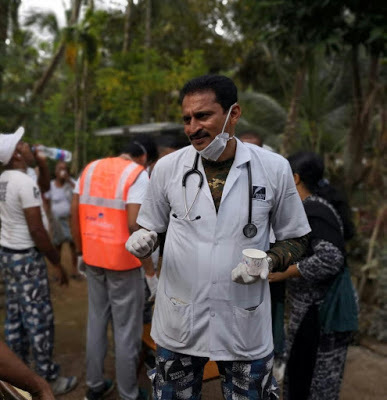
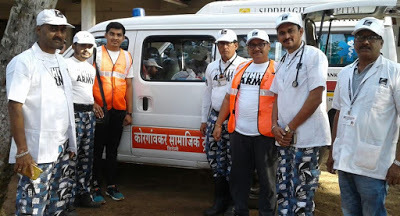
Dr Sheetal Patil and his colleagues Drs Shivraj Desai and Anand More, along with the volunteers of the White Army of Kolhapur, an NGO, provided medical care in many areas of Kuttanad, Haripad and Alappuzha
Photos: Dr. Sheetal Patil; the White Army of Kolhapur
By Shevlin Sebastian
When Dr Sheetal Patil, a homeopathy doctor from Kolhapur, Maharashtra switched on the TV, he felt disturbed to see the images of destruction during the floods in Kerala. “I felt the urge to do something,” he says.
So he got in touch with his friends, Ayurveda doctors Shivraj Desai and Anand More. All three are also part of an NGO called the White Army of Kolhapur which has been involved in social service and disaster management for many years. They decided that they would offer medical help in Kerala.
So, they met the head priest Kaadsiddeshwar Swami at the Siddhagiri Mutt in Kolhapur. “He connected us to a swami at the Ramakrishna Math at Kayamkulam,” says Sheetal. So, on August 21, the trio, along with a group of White Army volunteers, and accompanied by many boxes of medicine made the 36-hour journey by train to Kayamkulam. “We also took two ambulances for ease of travel in Kerala,” says Sheetal.
Using the Mutt as their base, the group travelled to many relief camps. “We treated around 200 to 300 patients in each camp at Alappuzha, Haripad and Edathua,” says Sheetal. “The majority of the people were suffering from fever, cough and body ache. Some had physical weaknesses.”
But Sheetal noticed that women in the 50 plus age group looked very depressed. “You cannot blame them,” he says. “They had lost their home and businesses. Their family life was completely disrupted. They knew they faced a grim future.”
Interestingly, the men did not look so shattered. “As for the younger people, they looked relaxed,” he says. “Perhaps, they felt confident they would be able to succeed through hard work and determination.”
With the help of the local people, the group also went into the interiors of Kuttanad and Edathua on small boats. “In those areas, people had different ailments,” says Sheetal. “In the villages, the major problem was fungal infections, which they got by constantly moving around in the water. Eventually, we distributed 8000 anti-fungal cream tubes.”
One day, they went into an old age home at Edathua, which was run by a priest and nun. It consisted of people who had been abandoned by their children. “I saw that two were bed-ridden,” says Sheetal. “Another group suffered from Alzheimer's Disease. There was a need for catheters because some inmates had lost control of their urine and bowel movements. A few needed hospitalisation, while a couple was undergoing psychiatric treatment.”
Primarily, the doctors gave first-aid treatment for body ache, skin infection, loose motion and fever.
“Seeing them, I realised it was a commentary of our times,” says Sheetal. “Today, young people are selfish and think about their own lives. So, they have no problems in abandoning their parents. It affected me deeply. This could be the fate of all of us when we grow very old and lose our health and mobility.”
When they were moving around, the group realised that the destruction had hit all classes. “I saw that water had entered the big bungalows as well as the small houses,” he says. “Everything was spoiled: the refrigerators, washing machines, microwave ovens, beds, utensils, furniture and the car on the porch.”
So, will Kerala recover? “I think, in terms of infrastructure, it will take a year,” says Sheetal. “The economy will also recover. But I don't know whether the people will overcome the mental trauma. So counsellors are the need of the hour. They have to play a major role.”
Interestingly, when asked to compare the people of Kerala with Kolhapur, Sheetal says, “Malayalis are peaceful, polite and co-operative, while Maharashtrians are aggressive but lovable. This aggressiveness is because we belong to the warrior class. After all, one of our ancestors was the warrior-king Shivaji.”
Following their eight-day stint, Sheetal has gained new insights. “What was very good to see was that during the disaster, the cooperation of the people went beyond caste, creed or religion,” he says. “There was no barrier. Everybody was helping each other in every possible way. This should be emulated all over India and the world, and not only in Kerala.
“Secondly, I realised that man has to love and respect Mother Nature. We should never go beyond its power otherwise, Nature will get angry. And lastly, we cannot take anything for granted because, at any moment, anything can happen.”
(The New Indian Express, Kochi, Thiruvananthapuram and Kozhikode)
Published on August 31, 2018 22:46
August 29, 2018
Saving Pigeons On The Ninth Floor
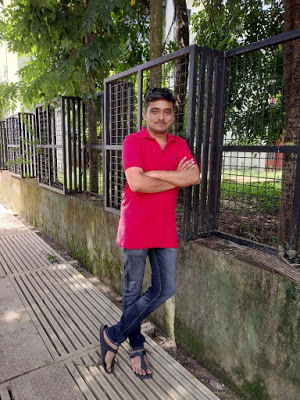
COLUMN: LOCATION DIARY
Director Vishnu Narayan talks about his experiences in the films, 'Maradona', ‘Gangster’ and 'Maheshinte Prathikaaram'
By Shevlin Sebastian
In a scene from the film, 'Maradona', Tovino Thomas, who plays the protagonist, wants to rescue baby pigeons sitting in a nest, in an opening in the wall of the 9th floor of a building by using bed sheets tied together to form a rope. He then has to sidle down outside the balcony, from the 10th floor, and all this was supposed to be done when it is raining heavily.
But the residents’ association of the block of buildings at Bengaluru which was the location for the shoot, refused to allow the use of artificial rain. “I felt very disappointed,” says debutant director Vishnu Narayan. “In the end, we decided we would shoot without the rain, and add it later, through computer graphics.”
But as the shoot was about to begin, amazingly, it started raining. “Immediately my eyes filled up with tears,” says Vishnu. “It came at the perfect time.”
Quickly, the director and his crew captured all the shots that they needed. Within half an hour, the rain stopped.
“The next scene did not need any rain,” says Vishnu. “In fact, we needed helicam shots. So, the rain stopped at the right time.”
Vishnu feels emotional when he recounts this incident. “I believe that our sincerity and honesty in making the film ensured that an Universal Power stepped in and helped us,” he says. “For the past two years, I have been working very hard on this film. After a lot of struggle, I could bring it to the screen.”
But there have been moments of light-heartedness during his career. In the film, ‘Gangster’ (2014), Vishnu, along with a group of youngsters, had a chance to work with Mammootty for the first time. “He was a legend to us,” says Vishnu, who was an associate director in the film. “We watched his films from our childhood.”
Just before the shoot began, at Mangalore, Mammootty had a look around. “All of us were wearing T-shirts and shorts, including the director Aashique Abu,” says Vishnu.
But Mammootty called Aashique and in front of the crew, he said, “When these guys come tomorrow, ask them to wear jeans. So much of the new-generation style is enough.” Then he walked away.
“We were all stunned,” says Vishnu “We did not know whether he meant it or not.” But the crew carried on wearing shorts. After several days, again, during the middle of the shoot, Mammootty again spoke to Aashique, “I told you once before, everyone should wear jeans, instead of shorts.”
Once again, the youngsters carried on wearing shorts. But, on the last day of the shoot, in Goa, after 40 days, Mammootty suddenly appeared. “And he gave us all a shock,” says Vishnu. “He was wearing a T-shirt and shorts. When we looked at him, with our mouths open, he said, 'I am new-generation now'. That was when we realised that he was actually teasing us when he said we should all wear jeans. He showed that he is as young as all of us.”
Then, in another sequence for the same film, the location was at the port of Mangalore. “Actor Kunchan was standing on top of a pile of coal and was supposed to roll down,” says Vishnu. “Mammootty was sitting on the bonnet of a Range Rover at the bottom and was supposed to give a dialogue.”
There was coal dust everywhere. To get an overhead shot, the crew used a helicam which was imported from Ireland. “It was a big one, almost like a small helicopter,” says Vishnu.
The shoot began. But when the helicam came closer, dust began to rise up fiercely in the air. “Soon, there was a black mist all around,” says Vishnu. “We could not see anything in the shot. We felt scared. If all this dust fell on Mammootty the shooting would have to be stopped.”
Aashique, Vishnu and other crew members ran through the dust to see what had happened to the superstar. “But when we reached the vehicle, we saw that an assistant, who had seen the dust arise, managed to locate a sheet in the car and covered Mammooty entirely with it. So no dust fell on Mammootty and we felt so relieved. And since the shot had come through nearly perfectly, we decided not to go for a re-take.”
But there were imperfect moments during the shoot of 'Maheshinte Prathikaaram' (2016). In one scene where the hero Fahadh Faasil is having a hand-to-hand fight with a character called Jimson on a ground near the Idukki dam, he sprained his ankle. “We had to put a bandage and the doctor advised two days of rest for Fahadh,” says Vishnu.
So, on the next day, the crew, including the director Dileesh Pothan, decided to play a game of cricket. The local boys also joined in. During the game, Dileesh had to chase a ball. But because of the rain, there were small wedges in the mud which had dried up in the sun.
“His foot got stuck in one of them and got sprained,” says Vishnu. “Dileesh was immediately rushed to the hospital and had to be put in plaster. It turned out to be far more serious than what had happened to Fahadh. “Thereafter, when the shooting resumed, we had to lift him on our shoulders when we had to climb steps or carry him on a chair,” says Vishnu. “So, two of the most important people in the film got injured at nearly the same time.”
(The New Indian Express, Kochi, Thiruvananthapuram and Kozhikode)
Published on August 29, 2018 01:12
August 27, 2018
When My Writer-Friend Departed Silently
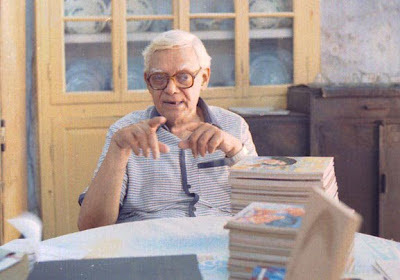
By Shevlin Sebastian
The other day, my friend Rudolph Vance called from Kolkata. During the course of the conversation, I asked him about our mutual friend Vernon Thomas. “Didn't you know?” he said. “He died sometime in January.” That sentence sent a jolt to me and a spreading feeling of pain through my body.
“How did it happen?” I said.
“Nobody knows,” said Rudolph. “He was living with his adopted son Paresh at a village near Kolkata, and died suddenly.”
Vernon was a dear friend of mine. He was a bachelor who had published 140 books for children. They were mostly detective novels about theft and murder which were published by the Mumbai-based Pauline Publications. Since he was not published by mainstream publishers, the writing fraternity was not aware of him. But he was a stalwart of the Anglo-Indian community.
For 12 years, on every Thursday, at 6 p.m., I would go his house and have a two-hour long conversation about writing, literature, politics, spirituality, music and so on. It was fun-filled, exhilarating and unforgettable. However, in the late 1990s, I quit Kolkata for Kochi. But I remained in touch with Vernon by phone.
In his house, apart from Paresh, there was a man called Ranen, along with his wife and son. Around 25 years ago, Ranen, who used to work near Vernon's house, befriended the author. Later, Ranen asked Vernon whether he could stay at his home, because he was having financial difficulties. Vernon said yes. And it was not surprising why. All his relatives had migrated abroad, to the UK, USA and Australia.
In 2014, Vernon's health began to fail. And his mind had also begun to fade away. When I called him at that time, he told me that his mother had died a week before. Vernon was 80 then.
Last year, a builder came and offered money so that he could demolish the house and make a multi-storeyed building. Vernon lived in a spacious Victorian-style house, with four bedrooms, a living room and a dining hall, which led out to a spacious courtyard, with a large mango tree. But he had resisted the temptation for decades. But this time, Ranen handled the discussions, made the feeble Vernon sign an agreement, and allegedly grabbed 90 per cent of the money.
Hence, Paresh had no option but to take Vernon to his ancestral home.
And now he has passed away. It was all so sad. What was sadder to know was that no obituary appeared in the newspapers. This was an undeserving fate for such a brilliant, good-hearted and kind individual.
Nevertheless, I am sure Vernon has found happiness in Heaven. And I am also sure, he will heal the heartache that I feel that I did not know of his death for so many months.
I miss you, my dear friend!
(Published as a middle in The New Indian Express, South Indian editions)
Published on August 27, 2018 02:11
August 24, 2018
All's Well That Ends Well
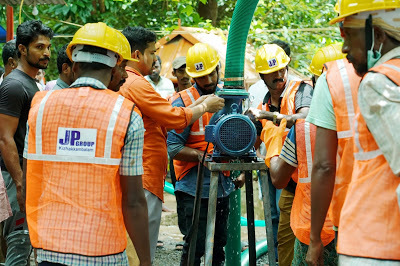
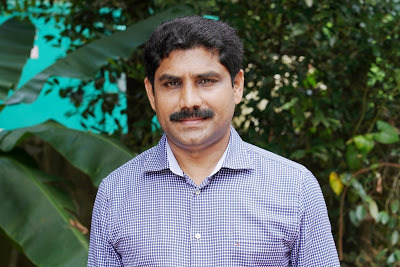 Entrepreneur Peter Joseph has embarked on a project of cleaning 8000 wells in the Sreemulanagaram panchayat at Ernakulam district
Entrepreneur Peter Joseph has embarked on a project of cleaning 8000 wells in the Sreemulanagaram panchayat at Ernakulam district
Photos: Workers of the J&P Group setting up a pump; entrepreneur Peter Joseph
By Shevlin Sebastian
When entrepreneur Peter Joseph was travelling in Ernakulam district soon after the floods had receded, he saw, with a sense of shock that all the wells were in a sorry state. “They were filled with dirty water, slush and mud,” he says. “I also came to know that the water from the septic tanks had also leaked into the wells.”
Peter realised that when the people returned to their homes, the first thing they needed was clean water to wash and clean the house. So he decided he would clean up the wells. But Peter did not know where to start. So he met Aluva MLA Anwar Sadat who suggested the Sreemulanagaram panchayat.
Thereafter, through his company, J&P Group, he bought 20 sludge pumps, pipes and generators, since most houses did not have any power supply.
On Wednesday, August 22, at the inaugural function, Sadat said, “This is a voluntary contribution by Peter. I am very happy that he is doing this. It will be a great help to the panchayat.”
Soon, the work began. At a middle-class house, the thick plastic pipe snakes out from the well through the courtyard towards the road. When the pump starts, there is a buzzing noise. Soon, a steady stream of water comes out of the pipe. The workers, consisting of plumbers and electricians, in orange jackets and yellow plastic caps, watch patiently.
Amazingly, within 20 minutes, the well is drained of water. “This is a high-speed pump,” says Peter. Thereafter, bleaching powder is poured inside the well. Usually, in well cleaning, workers get down, balancing from ropes and physically clean the well. But that is no longer possible. “The walls are very weak because of the presence of water everywhere,” says Peter. “There is a danger that it might crumble.”
After the work is over, within two hours, the well begins to fill with natural water. “One reason for the quick filling-up, is because, again, there is a lot of water underground,” says Peter.
So far, Peter has spent Rs 12 lakhs to buy the pumps and other equipment. The other costs include labour and transportation. “It may come to about Rs 40 lakh, since we will be cleaning around 8000 wells in the panchayat,” he says.
Incidentally, the daily target is 250 wells. To ensure that happens, there is a 50-member crew. Over the noise of the pump, Peter says, “I felt a clean well was an important need for returning families. So I am happy to make a contribution to society.”
(The New Indian Express, Kochi)
Published on August 24, 2018 19:47
August 22, 2018
Helping Out During A Time Of Great Distress
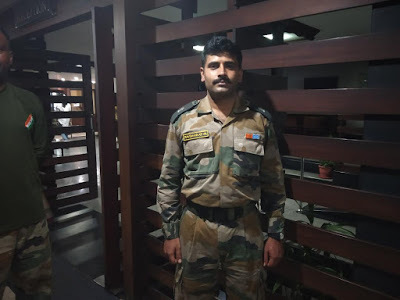
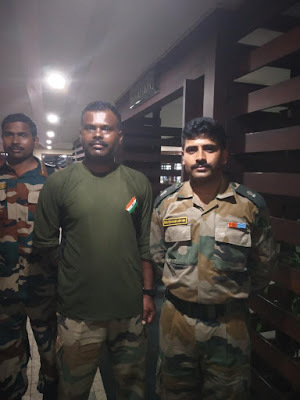
Major Ravishankar HN, of the 120 Engineer Regiment from Pune, talks about his experiences during the floods in Kerala
Photos: Major Ravishankar HN; Ravishankar (right) with subedar BS Jadhav and another colleague
By Shevlin Sebastian
The rain was falling in sheets as Major Ravishankar HN of the 120 Engineer Regiment from Pune set out in a metallic boat along with a few colleagues in other boats from Thottakkattukara in North Paravur to Aluva. He had been told that a few people were taking shelter in a mosque at Aluva. Local guides Anthony and I. Akbar were with him.
When they reached the mosque, he noticed that the ground floor was flooded. But on the first and second floor, there were 400 people, of different faiths, who were cramped together in a tiny area.
So the rescue began. “Firstly, we collected the disabled, old people, mothers, young children, and many who required medical attention,” says Ravishankar, at a Kochi hotel. “Those who took medicines regularly were not able to take them as it was all washed away in the water. So they were suffering the after-effects.”
The team did several trips. “In the end, we saved 75 people while people on private and fishermen boats also helped and got everybody to safety,” he says.
On one trip, when they were returning, Ravishankar received a call on his mobile. It was Major Vikas Kumar Shrivastava, his unit officer, who is now based in Delhi. “He told me that a few lecturers in a college that he had studied in Aluva were stranded at the same mosque,” says Ravishankar. “He asked me to rescue them.”
Ravishankar promised to do so. But when he checked he discovered that they had already been saved. Very soon, the lecturers called Vikas and expressed deep gratitude. Not surprisingly, Vikas quickly called Ravishankar and thanked him.
On another occasion when they approached a building which held a group of people, one of the members said, “Don’t rescue us, there is someone a little further away who needs more help.” This turned out to be a pregnant lady, in her eighth month, who was bleeding. “We rescued the 26-year-old,” says Ravishankar. “And she has been treated and is okay now.”
Interestingly, more than the desire to be evacuated, the people were looking for food parcels and water bottles. “Many of them were starving, especially in the remote areas,” says Ravishankar. “They were beyond the reach of Air Force helicopters who were air-dropping the packets.”
In fact, according to the Major's calculation, he was receiving anywhere between 300 to 600 calls every day, and all of them were for food. They came to know of his number because it had been flashed on one of the news channels. “As a result, we were always carrying food packets and water bottles in all our boats,” says Ravishankar.
Meanwhile, the Army team was impressed by the attitude of the people. “The people were not scared or worried,” says subedar BS Jadhav. “Nobody cried, whether it be an old person or a child. They remained calm and waited patiently. In fact, they were very confident we would come and rescue them.”
For Ravishankar, the eye-opener was the inherent sense of syncretism among the people. “It is only at moments of extreme distress that the essential human nature comes out,” he says. “And in Kerala, everybody had forgotten about their caste, creed or religion and came together.”
Even the administration came together. “There was such a high degree of coordination between the Inspector General of Police Vijay Sakre, Rahul Nair, Superintendent of Police, Aluva, District Collector K. Mohammed Y. Safirulla and myself. As a result, we were sent to places where no one had gone,” says Ravishankar.
And in one such journey, the team recovered six dead bodies. These people had been taking shelter in a building next to the St. Xavier’s church at Kuthiyathodu and it collapsed. “It was pitch-dark but we used searchlights for navigating,” says Ravishankar. “It was also raining heavily but we managed to get the job done.”
In fact, so focused was the team on rescue that they frequently missed having meals. “You will not believe this, but we worked for 72 hours at a stretch,” he says.
In between all this hectic work, Ravishankar would take two calls, in the morning and evening. It was from his wife Meghana, at Pune, who would inquire about his well-being while Ravishankar would ask about his 22-month-old son Aakarsh.
Apart from rescue work, he was specifically asked by A Kowsigan, the Managing Director of the Kerala Water Authority to help restore the main substation at the Aluva water treatment plant. “With the help of engine fitters, we were able to repair the pumps and transformers within four hours,” says Ravishankar. “I was happy to know that more than three lakh people received water at their homes soon after that.” Later, the team also repaired the pump houses at Choondi, Muppathadam and Ramamangalam.
Even though it is 10.30 p.m., Ravishankar shows no signs of tiredness. “It has been an enormous experience for me, as well as my team,” he says. “And this is what I have understood. Life hangs by a thread. Anything can happen at any time. So cherish each and every moment.”
(The New Indian Express, Kochi, Kozhikode and Thiruvananthapuram)
Published on August 22, 2018 23:54
August 21, 2018
Making A Timely Contribution
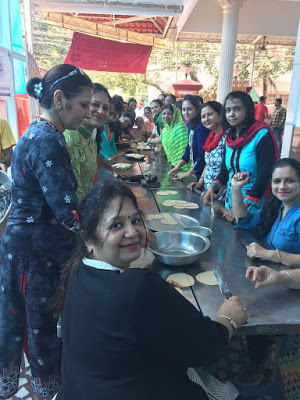
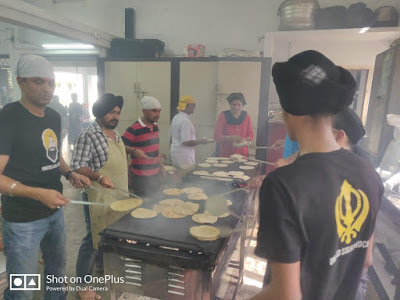
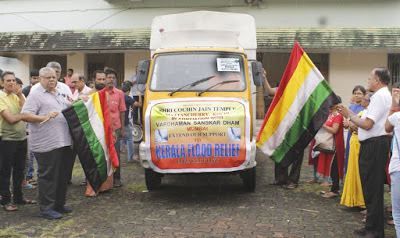
Members of North Indian communities – the Agarwals, Sikhs and Gujaratis – are making hygienic and wholesome food for the flood victims in Kerala
Photos: Women at the food kitchen run by the Jan Kalyan Society and the Agrawal Yuva Mandal (Kerala); Sikh men making chappatis at the Sri Guru Singh Sabha Gurudwara at Thevara, Kochi; the Gujarati community at Mattancherry flagging off flood relief materials
By Shevlin Sebastian
Rotary Club member Simi Stephen has just arrived at lunch time outside the North Indian Charitable Trust building at Udaya Nagar, Kochi. She had come to collect 200 vegetable biriyani packets. They had been made by the members of the Jan Kalyan Society and the Agrawal Yuva Mandal (Kerala). Simi did not have to wait long. Soon, the packets were delivered and she was on her way.
Meanwhile, in the courtyard, several ladies are sitting around a long table. They are pulling mounds from a long piece of dough. Then it is made into a circle and flattened with a rolling pin. Just ahead of them, there are several men who are making the dough. And the uncooked puris are fried in large pans containing oil.
Inside the hall of the building, vegetable pulao and biriyani are being made. There is a hubbub of noise. There is also enthusiasm and energy swirling around, as the food is put inside cellophane packets.
“Each packet contains five puris and a pickle, along with a vegetable dish,” says
Hemant Baranwal, secretary, Jan Kalyan Society (JKS).
“The camp began on Friday, August 17 and we began with 5000 packets a day,” says NN Mittal, patron, JKS. “Now we are supplying around 20,000 packets a day.”
They are being sent to the relief camps as well as flood-affected areas in North Parur, Varapuzha, Neriamangalam, Njarakkal, Kalamassery, Pukkattupadi, Kaloor and Vaduthala. “It has also been used by the Navy when they were dropping food packets,” says Hemant.
Asked why they have decided to help, the bearded Parikshit Khandelwal, 40, a software engineer, says, “Kerala is our homeland now. I am a third-generation North Indian and my son has just been born,” he says. “We don't think about caste or community in helping people. The people of Kerala are our people.”
Adds Mittal, “I have been living in Kochi for the past 30 years. I consider myself as a Keralite.”
Rekha Bansal, who is making puris, says, “I was born and brought up in Kochi and did my graduation from Maharaja's College. I belong here one hundred percent. So I wanted to help when I saw the devastation on TV.”
Industrialist SS Agarwal, a committee member, JKS, who is standing nearby, is helping in his own way. He has a flour mill at Binanipuram. And for the past few days, his factory doors are open to all. “I came to know that there is a flour shortage, so I decided to help,” he says. Approximately, 1000 bags of 50 kgs have been distributed so far to those who need it.
Asked how long they will be doing this charity work, Hemant says, “As long as food is required for the flood relief victims.”
Meanwhile, at the Sri Guru Singh Sabha Gurudwara at Thevara, women sit in a semi circle on the floor, and make chappatis using the rolling pin and wooden board. In the next room, there is a hissing sound, as a group of young Sikh men cook the chappatis on a broad dosa tawa.
Like the Agarwals, the Sikhs are also making meals for those affected by the floods. “Apart from chappatis, rice and dal are also being made,” says a member of the community, under the aegis of the 'United Sikhs of Kochi', which is coordinating the relief work. “We are making 2300 meals a day. Some of it will be sent to Wayanad, too.”
One who is very happy is Simi. “The gurudwara has been giving us 1500 packets every day,” she says. “Their families have come together and are making the food in a very hygienic manner.”
The Gujaratis of Mattancherry are also doing their bit. The Shri Cochin Jain Temple, Mattancherry, in association with Vardhaman Sanskar Dham, Mumbai have also distributed items like cloths, mats, pillows, paper plates and food like chappati, dal, sambhar, rice and briyani to various relief camps in Ernakulam district. “On August 19, Kochi MLA K J Maxi visited our distribution centre and he was very happy to see what we had done,” says community member Paresh Chandulal Shah. “We want to do our bit for the people of Kerala.”
(The New Indian Express, Kochi and Thiruvananthapuram)
Published on August 21, 2018 00:11
August 18, 2018
Fear And Panic In Kerala
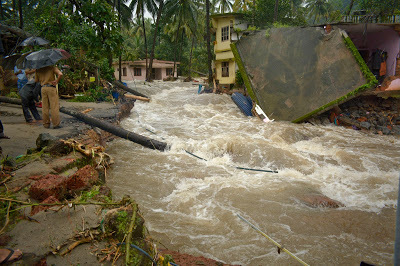
By Shevlin Sebastian
George Mani raised his hands in helplessness. “The water has entered my home in Alappuzha,” says this staff member of a club in Kochi. “They called me frantically, my wife and mother. I told them to put one bed on top of the other and sit there. My son is working in the Gulf, and I am unable to go because there is no transport. ”
But what if the water rises? “I don't know,” he says, shaking his head. “All the people in the area are in the same position. They have all called for help and are waiting.”
Panic. Fear. Anger. These are the emotions that are swirling through the hearts of 3.5 crore Keralites as an unprecedented and non-stop rain has destroyed the State. There is only one conversation everywhere: What is the progress of the water, let loose by the opening of the shutters of 34 dams? Where is it going? Will it head in our direction? To our homes? To our workplaces? Will it destroy our livelihood and families?
So much has changed. When earlier, we would look with a beaming joy when it rained, now there is terror in our eyes at its fierce force. Where earlier, we would look at gushing water at the many waterfalls that dot the state with wonder, now there is horror.
The psychological impact is devastating, not to mention the financial calamity. As people come to terms with their dear ones lost to a sudden landslide, as houses, in which huge investments are done, vanish in a few seconds and businessmen ponder the loss of their valuable products, all swamped by water, more water and finally, too much water.
Will Kerala recover?
Only Time will tell.
(The New Indian Express, Kerala editions)
Published on August 18, 2018 01:38
August 13, 2018
Manipulating The Mind
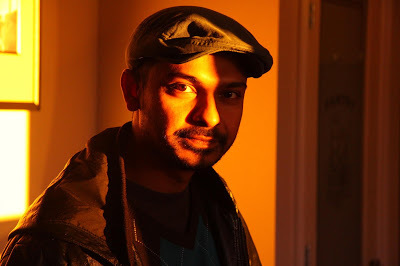

The Vancouver-based Malayali director Ray Raghavan talks about his stunning debut sci-fi feature film, 'Violentia'
By Shevlin Sebastian
Very early on in the science fiction film, 'Violentia' (2018), a student is shown entering the foyer of a school. He is wearing a blue denim shirt and black trousers, a rucksack on his back and holds a guitar case in his hand. A group of youngsters, a mix of boys and girls enter.
One of the boys pushes against the guitar-toting student, who goes and hits a locker. The group gives mocking grins. The next scene you see is of the boy opening the guitar case, pulling out a hunting-gun and shooting the students, one by one. A girl's scream can be heard on the soundtrack.
In a parallel screen, the girl's father Dr Adam Anderson is returning home in a car from work. As he enters the house, he senses something is wrong. When he climbs up the stairs and enters the bedroom, his weeping wife, wearing a blue miniskirt, is on her knees, her hands tied at her back. Suddenly a masked man lunges forward from behind a curtain with a knife and attacks Anderson, who fights back.
The death of his daughter prompts Anderson, a pioneer in the field of nanobiotechnology, to look into a psychopath's memories to find reasons for violence and ways to treat it.
“The film explore the reasons why people choose violence, and the extremes that governments go to, in order to prevent such violence from happening,” says the Vancouver-based Indo-Canadian director Ray Raghavan. “So, Anderson wants to reprogram violent people, including the one who killed his daughter.”
It is a taut, riveting film but the many instances of random violence can be unnerving. Nevertheless, the film has received good reviews. In the prestigious Sight and Sound Magazine, of the British Film Institute, critic Anton Bitel placed Violentia in the top ten of the Sci-Fi-London fest 2018 held in end May.
Writes Bitel: 'Raghavan’s film is a twisty affair, playing out its morality drama (concerning the limits of free will and state control) on an ambiguous stage where people’s memories, real or manufactured, can be viewed “like a movie clip” – making them difficult, crucially, to distinguish from the texture of the film’s own constructed reality'.
And it seemed to have gone down well with the audience, too. After the screening, there was a line of people who wanted to take Ray's autograph. “I was blown away by the love that I received,” says Ray.
Asked why he focused on violence in his debut feature film, Raghavan recalled a childhood memory. For a few years, he studied at the Kendriya Vidyalaya school in Jagdishpur, Uttar Pradesh because his father, an engineer, worked in a steel company in that area.
“Some of my fellow students looked at me as an outsider,” says Ray. “They came from different backgrounds, the children of villagers, businessmen, farmers, and politicians. And they were very motivated in assaulting me. They felt I was a rich kid because I came to school in a car.”
That got Ray interested in the subject of physical force: why do people get violent? Later, at Delhi University, Raghavan saw Stanley Kubrick's classic 'A Clockwork Orange'. “It was a tremendous film that deals with violence in great detail,” says Ray.
Then in recent years, he came across a TED talk where scientists Steve Ramirez and Xu Liu of the Massachusetts Institute of Technology talked about their research on whether they could edit memory. The duo aims a laser beam into the brain of a living mouse to activate and manipulate its memory.
“All these thoughts came into my mind when I began writing the script of 'Violentia',” says Ray, who migrated to Canada in 2005 and did a year's stint at the Vancouver Film School. He also worked for two years as an intern in a production house.
And creative talent runs in the family. His late grandfather was the famous writer KG Raghavan Nair, based at Ottapalam, Kerala, while both his Kochi-based parents are avid film buffs.
Asked about his future plans, Ray says, “I want to continue writing and making films that are hard-hitting and gritty.”
(A shorter version appeared in the Sunday Magazine, The New Indian Express, South India and Delhi)
Published on August 13, 2018 22:25



